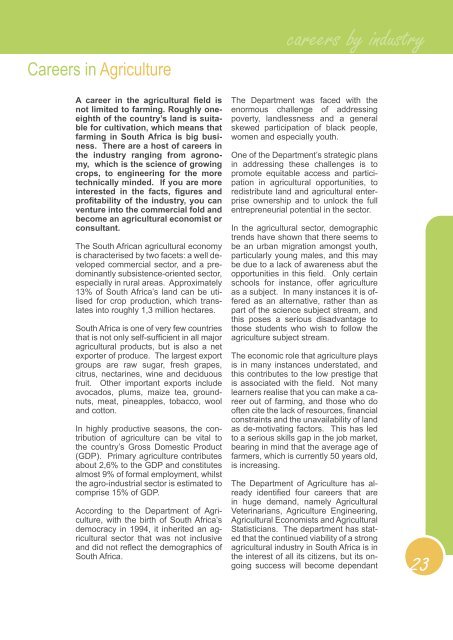CAREER - My SA Career Guide
CAREER - My SA Career Guide
CAREER - My SA Career Guide
You also want an ePaper? Increase the reach of your titles
YUMPU automatically turns print PDFs into web optimized ePapers that Google loves.
<strong>Career</strong>s in Agriculture<br />
A career in the agricultural fi eld is<br />
not limited to farming. Roughly oneeighth<br />
of the country’s land is suitable<br />
for cultivation, which means that<br />
farming in South Africa is big business.<br />
There are a host of careers in<br />
the industry ranging from agronomy,<br />
which is the science of growing<br />
crops, to engineering for the more<br />
technically minded. If you are more<br />
interested in the facts, fi gures and<br />
profi tability of the industry, you can<br />
venture into the commercial fold and<br />
become an agricultural economist or<br />
consultant.<br />
The South African agricultural economy<br />
is characterised by two facets: a well developed<br />
commercial sector, and a predominantly<br />
subsistence-oriented sector,<br />
especially in rural areas. Approximately<br />
13% of South Africa’s land can be utilised<br />
for crop production, which translates<br />
into roughly 1,3 million hectares.<br />
South Africa is one of very few countries<br />
that is not only self-suffi cient in all major<br />
agricultural products, but is also a net<br />
exporter of produce. The largest export<br />
groups are raw sugar, fresh grapes,<br />
citrus, nectarines, wine and deciduous<br />
fruit. Other important exports include<br />
avocados, plums, maize tea, groundnuts,<br />
meat, pineapples, tobacco, wool<br />
and cotton.<br />
In highly productive seasons, the contribution<br />
of agriculture can be vital to<br />
the country’s Gross Domestic Product<br />
(GDP). Primary agriculture contributes<br />
about 2,6% to the GDP and constitutes<br />
almost 9% of formal employment, whilst<br />
the agro-industrial sector is estimated to<br />
comprise 15% of GDP.<br />
According to the Department of Agriculture,<br />
with the birth of South Africa’s<br />
democracy in 1994, it inherited an agricultural<br />
sector that was not inclusive<br />
and did not refl ect the demographics of<br />
South Africa.<br />
careers by industry<br />
The Department was faced with the<br />
enormous challenge of addressing<br />
poverty, landlessness and a general<br />
skewed participation of black people,<br />
women and especially youth.<br />
One of the Department’s strategic plans<br />
in addressing these challenges is to<br />
promote equitable access and participation<br />
in agricultural opportunities, to<br />
redistribute land and agricultural enterprise<br />
ownership and to unlock the full<br />
entrepreneurial potential in the sector.<br />
In the agricultural sector, demographic<br />
trends have shown that there seems to<br />
be an urban migration amongst youth,<br />
particularly young males, and this may<br />
be due to a lack of awareness abut the<br />
opportunities in this fi eld. Only certain<br />
schools for instance, offer agriculture<br />
as a subject. In many instances it is offered<br />
as an alternative, rather than as<br />
part of the science subject stream, and<br />
this poses a serious disadvantage to<br />
those students who wish to follow the<br />
agriculture subject stream.<br />
The economic role that agriculture plays<br />
is in many instances understated, and<br />
this contributes to the low prestige that<br />
is associated with the fi eld. Not many<br />
learners realise that you can make a career<br />
out of farming, and those who do<br />
often cite the lack of resources, fi nancial<br />
constraints and the unavailability of land<br />
as de-motivating factors. This has led<br />
to a serious skills gap in the job market,<br />
bearing in mind that the average age of<br />
farmers, which is currently 50 years old,<br />
is increasing.<br />
The Department of Agriculture has already<br />
identifi ed four careers that are<br />
in huge demand, namely Agricultural<br />
Veterinarians, Agriculture Engineering,<br />
Agricultural Economists and Agricultural<br />
Statisticians. The department has stated<br />
that the continued viability of a strong<br />
agricultural industry in South Africa is in<br />
the interest of all its citizens, but its ongoing<br />
success will become dependant<br />
23


